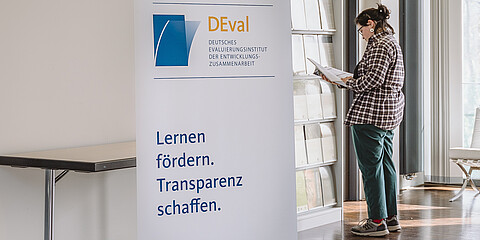
Goals and Functions
The German Institute for Development Evaluation (DEval) was established in 2012. It provides governmental and non-governmental development cooperation organisations with independent and scientifically sound evaluations, which they can feed into their strategies, instruments and programmes. By enabling evidence-based policy-making, DEval aims to make German development cooperation more effective and to increase transparency in the use of public funds. For this purpose, DEval is mandated by the German Federal Ministry for Economic Cooperation and Development (BMZ).
Our Functions
DEval’s core task is to analyse and evaluate German development cooperation activities, taking an independent and practice-oriented approach that draws upon academic research. Thus, our institute acts at the interface between politics, academia and government administration with the overarching goal of providing valuable evidence for the development cooperation policy area.
Another one of our central tasks is to further develop existing evaluation methods and standards with a view to improving evaluation practice. DEval also works on strengthening evaluation capacities in the partner countries of German development cooperation. Last but not least, it is our duty to disseminate the knowledge gained in the evaluation, in order to promote learning processes and to facilitate decision-making in development cooperation.
Our Stakeholders
Our evaluations and the resulting recommendations are aimed primarily at political decision-makers but also at governmental and civil society development organisations and at partners in developing and emerging countries. Other target groups include academics and experts from evaluation practice.
In addition, we strive to make complex issues in German development cooperation accessible to a broad expert audience. To this end, we make all our evaluation reports available on our website.
Memberships and Collaborations
- European Evaluation Society (EES)
- Gesellschaft für Evaluation (DeGEval e.V.)
- European Association of Development Research and Training Institutes (EADI)
- European Consortium for Political Research (ECPR)
- Global Evaluation Initiative (GEI)
- EvalPartners
- Red de Seguimiento, Evaluación y Sistematización de América Latina y el Caribe (ReLAC)
- Campbell Collaboration
- International Initiative for Impact Evaluation (3ie)
- Development Engagement Lab (DEL)


